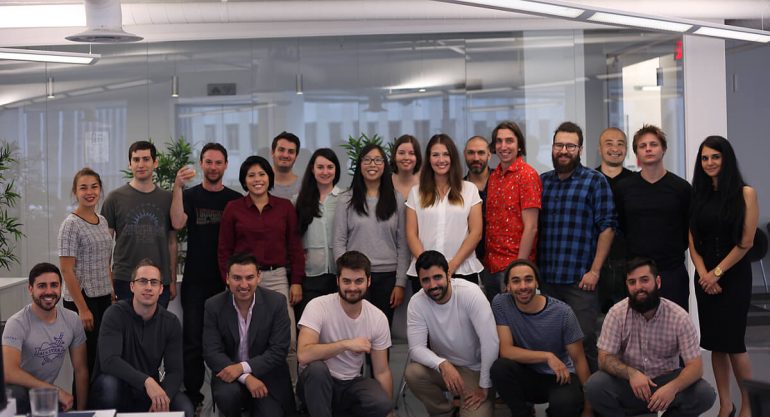Montreal-based web and mobile app development company Leadweb is planning to go ahead with its proposed supercluster without government funding.
Founded in 2012, Leadweb recently applied for a part of the $950 million in federal grants from the Innovation Superclusters Initiative (ISI). Leadweb proposed developing what it called a “Strategic Intelligence” supercluster with IBM, RBC, and other companies working in blockchain technology.
Despite raising $112 million in commitments with collaborators, the proposal wasn’t accepted, possibly due to not raising enough private funding to compete with the billion dollar commitments and amount of companies involved in the winning proposals, says Leadweb VP of Strategic Partnerships André Dupont-Moguel.
Overseen by the government’s Innovation, Science and Economic Development department, the ISI’s goal is to accelerate growth and business development in specific industries and business ecosystems. The government initiative will match funds raised by non-for-profit collaborative groups – the superclusters – made up of both public and private sector organizations, including research institutes and large, medium and small businesses. Winners are expected to be announced in early 2018.
Most the ISI supercluster proposals were based in a single province or neighbouring provinces, and those shortlisted are spread throughout Canada. Two of nine shortlisted are based in Quebec, where one is focused on AI related to manufacturing, infrastructure, and retail, and the other is focused on mobility systems related to aerospace, ground transportation and advanced manufacturing.

Unlike these, which propose building infrastructure for specific industries, Leadweb’s supercluster proposal combined many industries working with blockchain, which Dupont-Moguel calls its own, new industry.
“The objective was to build a full ecosystem around blockchain,” he says. “Blockchain pairs with IoT, big data and deep learning. The technologies leverage each other. We wouldn’t get involved in a full IoT project unless there is blockchain involved, for example.”
Another difference between Leadweb’s proposal and those shortlisted is that Leadweb’s came with cash commitments from investors rather than companies. These funds would go towards blockchain training, talent acquisition, and the creation of new blockchain-based businesses instead of helping companies finance their own projects that they may have pursued anyway. “That type of strategy helps companies grow,” said Dupont-Moguel. “In the end, it depends where the government thinks its investment will profit more the economy long term.”
RBC and IBM are still committed to working with Leadweb, says CEO Louis Cleroux, and the company’s supercluster initiative will go ahead without federal funding.
“The objective is to create the same thing with private money. Then if we do get government money later, it’s just an extra step for the project,” says Cleroux.
“The ICO problem is that everybody’s waiting for the SEC in the United States to make clear regulations. Canada doesn’t like to jump before the SEC does.”
Thanks to the publicity Leadweb’s supercluster proposal received, Cleroux says that government money might come sooner rather than later. More partners have signed on, and the company is now in discussions with other Quebec superclusters to start what he calls a ‘mega supercluster.’
Superlatives aside, Cleroux hopes this merger could also come with provincial funding. “It would make sense for Quebec because all the players are lined up and the projects are ready,” he says, though he doesn’t yet know how much money the province would or could offer.
More private or public funding would also help Leadweb build a Montreal-based business accelerator to be called “The Blockchain Centre of Excellence,” for which the company would work to recruit global talent.
Whether a merger of superclusters and an offer of provincial funding happens or not, Leadweb is still planning to launch its ExMachina Blockchain in early 2018, which is meant to be the basis for its supercluster ecosystem. “We’re hoping for a three-month window to release the first version,” said Cleroux. “This will be to convert money into tokens. For a full exchange – to trade money – we’re looking at a six-month window.”
The ExMachina system will work to perform transactions quickly and in a fully decentralized way. “The current blockchain networks were simply too slow to execute that,” says ExMachina Network lead developer Steve Rodrigue. “When you have artificial intelligence, you need to process data, so I wanted to do that without having to host the data myself, because the goal is for people who put data on the blockchain to actually own the data.”
Rodrigue’s solution involves smart applications where miners take on specialized roles to speed transactions. “On my blockchain, applications can connect to one another,” he says. “During our tests, we’ve been able to scale up to one million transactions per second using 600 servers using proof of stake.”
He continues, “The application discovers which peers have more bandwidth and coins and ranks them. In a normal blockchain, it’s one application that receives transactions, processes them, creates the block, verifies the block, and stores the block. But I disconnected each part, so it’s possible to host only the part that you actually want to do. If you have a lot of bandwidth, you would aggregate all transactions. If you have processing power, you’ll be a verifier.”
Once the blockchain is built, the supercluster will start with just one project: a digital assets wallet with AI capabilities and M2M transactions, says Dupont-Moguel. “Machines will have their own wallets and be able to trade to other machines and execute their work faster and more efficiently.”
Like other blockchains, Leadweb’s ExMachina Network will require a token system to pay miners to process information. For this, the company is planning to launch an ICO in early 2018, though it’s waiting to see what precedent US government regulators set with regards to ICOs before launch.
“We’re working with Canadian regulators to get the necessary permissions,” says Leadweb strategy consultant Eamon Leonard. “They’re pretty open to this. The ICO problem is that everybody’s waiting for the SEC in the United States to make clear regulations. Canada doesn’t like to jump before the SEC does. But for applications like a cryptowallet, regulations are clearer.”

